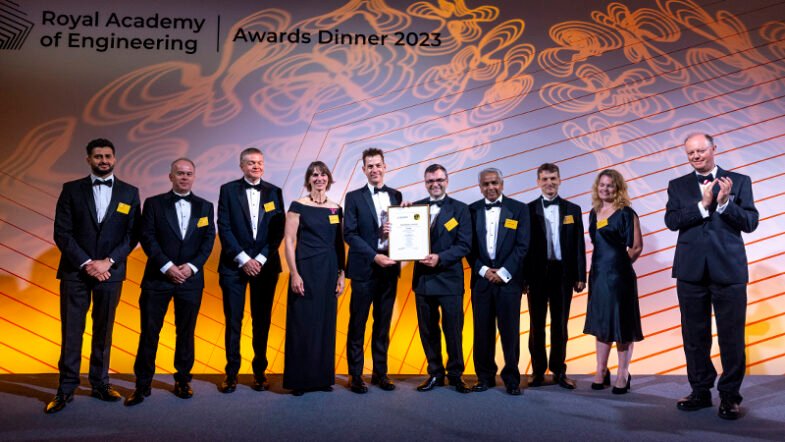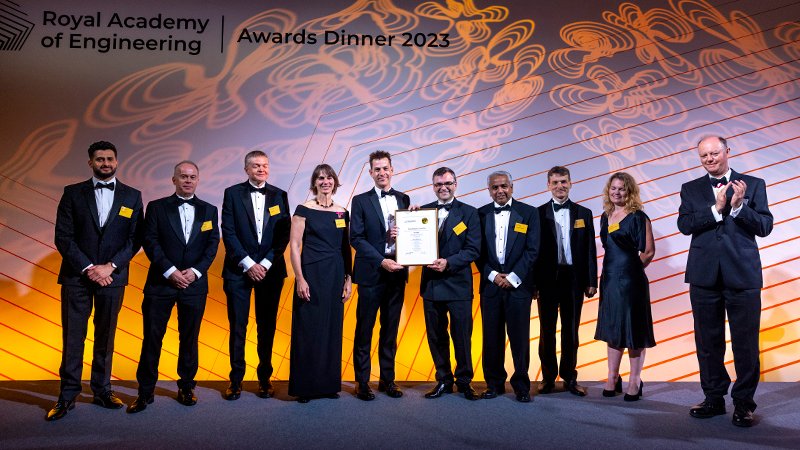The MacRobert Award, administered by the Royal Academy of Engineering, is the oldest and most prestigious prize for engineering innovation in the UK.

The 2023 MacRobert Award has been given to Ceres Power for its innovative clean energy technology. The MacRobert Award, honouring the best engineering innovations in the UK, was given to Ceres in recognition of a revolutionary fuel cell technology that is expected to significantly contribute to the global decarbonization at the scale and rate necessary to save the planet.
At the Royal Academy of Engineering Awards Dinner in London on July 13, HRH The Princess Royal, the Academy’s Royal Fellow, presented the winning team behind the Ceres SteelCell with the MacRobert Award gold medal and a £50,000 prize.
The MacRobert Award, administered by the Royal Academy of Engineering, is the oldest and most prestigious prize for engineering innovation in the UK. Ceres joins a distinguished group of past MacRobert Award winners, many of whom have altered the world in which we live.
The MacRobert Award winners have exemplified the sheer ability of UK innovators to develop world-leading, commercially viable products across all sectors of engineering, from the CT scanner to the first television graphics system and the Raspberry Pi mini-computer. Quanta Dialysis Technologies, the winner for 2022, has made portable, high-performance dialysis a reality.
Innovations must exhibit exceptional engineering creativity, commercial success, and real social benefit to be eligible for the MacRobert Award. Fuel cells for electricity production and electrolysers for green hydrogen are two examples of Ceres’ groundbreaking clean energy technology.
The solid oxide cell, which is made from widespread low-cost materials and combines an inventive deposition technique with a highly distinctive stack technology, impressed the judging panel. Due to this technology, one cell can light up an entire room, but the 250 megawatts of capacity expected to be operational in 2024 could power 500,000 homes.
Ceres uses a gadolinium-doped ceria ceramic membrane as an electrolyte at 500-600 C, achieving a ‘Goldilocks’ temperature for performance, fuel flexibility, cost, and robustness. Its licensing model enables partnerships with Bosch, Doosan, and Weichai to deliver systems and products for decarbonization in power generation, transportation, industry, and everyday living.
The judges praised the reversible technology, which efficiently generates electricity using multiple fuels and generates green hydrogen at low cost. This innovation is a significant breakthrough in the clean energy revolution.
The head of the Royal Academy of Engineering’s MacRobert Award judging panel, Professor Sir Richard Friend FREng FRS, declared: “Engineering innovation is the engine of economic growth and a sustainable future.
What Ceres Power has accomplished with SteelCell technology is impressive. The invention is expected to fundamentally alter the way hydrogen is produced and represents a significant advance in clean energy technology. It will give businesses the means to achieve net zero even in the most challenging industries.
“It’s time to honour the engineering pioneers who created the UK’s game-changing engineering innovations. The UK has a proud history of leading the world in engineering innovation, and Ceres’ amazing work highlights the significant contribution the UK can make in combating the ongoing climate crisis.
Dr. Caroline Hargrove, Chief Technology Officer at Ceres, praised the UK’s role in decarbonising the global energy system and winning the 2023 MacRobert Award from the Royal Academy of Engineering.
The UK is a science and technology powerhouse, with hydrogen and fuel cell technology being among the best inventions. A team of 500 scientists and engineers is developing electrochemical technologies to enable companies to deliver clean energy at scale and pace. Their goal is to achieve a net-zero future for families, society, and all.
